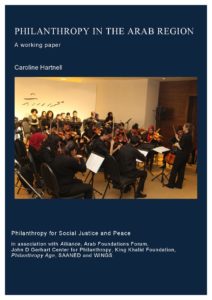 This report on philanthropy in the Arab region is part of a larger study, started in 2016, to review the current state of philanthropy in emerging economies and the role philanthropy is playing in the world today. This is the third report from the study, which we hope will eventually form part of the Philanthropy Bridge Series.
This report on philanthropy in the Arab region is part of a larger study, started in 2016, to review the current state of philanthropy in emerging economies and the role philanthropy is playing in the world today. This is the third report from the study, which we hope will eventually form part of the Philanthropy Bridge Series.
Earlier two reports in the series are on Indian philanthropy (published October 2017) and Russian philanthropy (published January 2018).
The report provides an overview of the current state of philanthropy in the Arab region, particularly shining a light on new areas and innovation within philanthropy, and the implications of these for its future role. We hope this will enable us to better address the question: how do we support and build philanthropy’s role as an agent of social change?
While it draws on existing reports and articles where available, the main aim is to throw light on Arab philanthropy through conversations with people who have been trying to promote, support or strengthen different areas of philanthropy. It looks at what currently exists in their particular area of philanthropy and what role it is playing in relation to the state and the private sector; what is driving it and what is holding it back; what potential role it could play and what is needed for the potential to be realized. It also shares examples of outstanding achievements.
Because the report is looking at a region that consists of 22 countries in the Middle East and North Africa,[1] inevitably there is much more about some countries than others. The report aims to present trends across the region, highlighting differences between countries and subregions where they became apparent.
The areas of philanthropy covered include various forms of giving by the wealthy, mainly through private foundations and corporate foundations,[2] and more recently impact investing; progressive/social justice philanthropy and community philanthropy; and giving by poorer individuals.
This study is neither exhaustive nor complete – so the report coming out of it should be considered a working paper, a work in progress, not a finished product. We hope that others reading the report will comment, disagree with it and add to it, perhaps publishing other working papers that might fill in the gaps.
This report is authored by Caroline Hartnell and published by Philanthropy for Social Justice and Peace in association with Alliance, Arab Foundations Forum, John D Gerhart Center for Philanthropy, King Khalid Foundation, Philanthropy Age, SAANED and WINGS. A summarised translation of the report is provided by the Arab Foundations Forum and SAANED for Philanthropy Advisory in the Arab Region.
To comment on findings or engage in a conversation about this report, please write to us at info@psjp.org.
[1] Algeria, Bahrain, Comoros, Djibouti, Egypt, Iraq, Jordan, Kuwait, Lebanon, Libya, Mauritania, Morocco, Oman, Palestine, Qatar, Saudi Arabia, Somalia, Sudan, Syria, Tunisia, the United Arab Emirates, and Yemen.
[2] The term ‘foundations’ is used throughout this report to refer to donor organizations, which use their own money to implement their programmes, as opposed to NGOs, which use donor money either from internal or external sources.